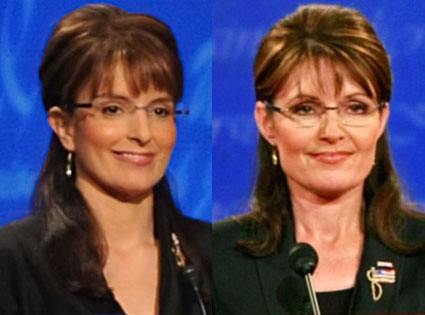
 |
Saturday Night Live is a television staple for critiquing world events. No stranger to this show is politics, and in particular the persona of Sarah Palin. Since her emergence during her run for Vice President, Sarah Palin has been mimicked countless times on Saturday Night Live by comedian Tina Fey. Fey portrays a rather convincing Palin and goes about making her seem like a fool on television; that is: she says absurd things, does things that do not make sense, and is made a mockery of on television. As Flowers and Young note in their article, there was "no one better to play Sarah Palin than Tina Fey" due to their uncanny resemblance (Flowers and Young, 48). The images of Tina Fey as Sarah Palin are extremely spread; Stelter writes of Tina Fey's first skit appreance as Sarah Palin on Saturday Night Live, "In fact, the positive media attention of the first skit enticed millions of viewers to watch the video clip, attracting 14.3 million viewers to NBC.com and Hulu.com" (Stelter, 2008). These widespread images, however, push the prominent idea that a lot of the American public has about Sarah Palin, which is that she is not competent enough to be in politics. Palin is often portrayed as unsure, uninformed, and not cut out for politics, not only on Saturday Night Live, but as a general opinion in the United States. This has made it hard for her to be accepted, and one can speculate that is partially because she is expected to act a certain way as a woman. |
| On the converse side, Hillary Clinton has been involved in politics for over two decades and is seen as too masculine. She is often portrayed as angry or crazy, and there is also a widespread belief that she is too aggressive as a woman. Clinton is seen as a nuisance in politics by some, while she is highly revered for her work by others. Clinton's age has also made her a target for criticism, as a lot of images are of her being old and angry. It is as if there is no happy medium between the two. Both of these women are on different political platforms and have different approaches to politics, yet are still ousted for one reason or another. Their sexuality is seen as a negative aspect to their careers, because women are thought of as more emotional, and neither of these women portray that characteristic. This moves into conversations of them being "nutcrackers" or lunatics who hunt moose, and they are never truly given a chance or taken seriously by the general public. I argue that this is because they are women, and are marginalized from the minute they decide to set foot into politics. Jen Nedeau sums up the larger societal problem of overall unacceptance, "Both women came from completely different political points of view. Both women presented themselves in completely opposite ways on the national political stage. But, both women experienced the wrath of a society seemingly afraid to see a woman in power. . . . While there has been no lack of critique, analysis and con- versation about how sexism played a role in both Senator Clinton and Governor Sarah Palin's campaigns, one thing that has not been well-identified is the resolution of how society will proceed and one day elect a female commander-in-chief" (2008). If Nedeau is correct, then sexism will be the limiting factor that chokes the United States' ultimate growth in progressive issues and becoming a completely inclusive country. |

|